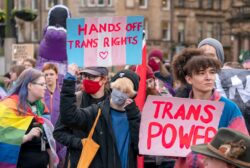Two demonstrations took place metres from eachother in Glasgow (Picture: PA)
Hundreds of activists on both sides of Scotland’s divisive gender recognition debate have gathered in Glasgow.
Scotland’s Gender Recognition Reform Bill was passed by a majority of MSPs in December with First Minister Nicola Sturgeon hailing it a ‘historic day for equality’.
Yet it was blocked weeks later in an unprecedented intervention by the UK government who argued the Bill impeded on the UK Equality Act.
Anti-transgender rights protesters Standing For Women gathered at George’s Square calling for a repeal of the Gender Recognition Act, telling crowds ‘the state is gaslighting’ them.
Kellie-Jay Keen-Minshull, also known as Posie Parker, said: ‘In your own lives, you cannot be heard… you feel like you cannot speak.
‘The watershed is finally here. From this moment on, we are not afraid, we will not be quiet, we will let women speak.’
Anti-transgender rights activist Posie Parker addresses crowds at the demonstration (Picture: PA)
Protesters accused First Minister Nicola Sturgeon of silencing women (Picture: PA)
Metres away, pro-reform activists dubbed the Cabaret Against the Hate Speech gathered in support of self-identification and the Bill.
A representative from the LGBT charity The Sisters of Perpetual Indulgence read aloud the Dylan Thomas poem Do Not Go Gentle Into That Good Night, telling the crowd: ‘Rage against the dying of the light – that’s what we have to do here today.
‘We do not have to show our rage with insults, we will respect you the more you put us down, we will show you love, because that is what our community is about – showing love, respect and tolerance.
‘We will not go gently into that good night, we will be here and we will be dancing.’
Pro-reform activists welcomed the right for self-identification (Picture: PA)
Scotland’s Gender Recognition Reform Bill has been at the forefront of trans rights in the UK (Picture: PA)
Scotland’s Gender Recognition Reform Bill would lower the age people can apply to change their gender to 16, remove the need for a medical diagnosis of gender dysphoria for a gender recognition certificate (GRC), and reduce the time an applicant needs to live in their acquired gender.
While it was welcomed by equality campaigners and the LBBT community, many opposed the reform, with the UK government arguing it could lead to gender tourism, and a disjointed law across the rest of the UK.
In the 25 years since devolution, not British government has taken the step to stop legislation from Holyrood passing Royal Assent by laying a section 35 order of the Scotland Act 1998.
Scotland Secretary Alister Jack said the decision had not been taken lightly but argued: ‘I am concerned that this legislation would have an adverse impact on the operation of Great Britain-wide equalities legislation.
The bill would have a significant impact on, amongst other things, GB-wide equalities matters in Scotland, England and Wales. I have concluded, therefore, that this is the necessary and correct course of action.’
Sturgeon described the move as a ‘full-frontal attack’ on the Scottish parliament, vowing it would defend the legislation.
Get in touch with our news team by emailing us at [email protected].
For more stories like this, check our news page.
Scotland’s Gender Recognition Reform Bill was intercepted by the UK government last month.





